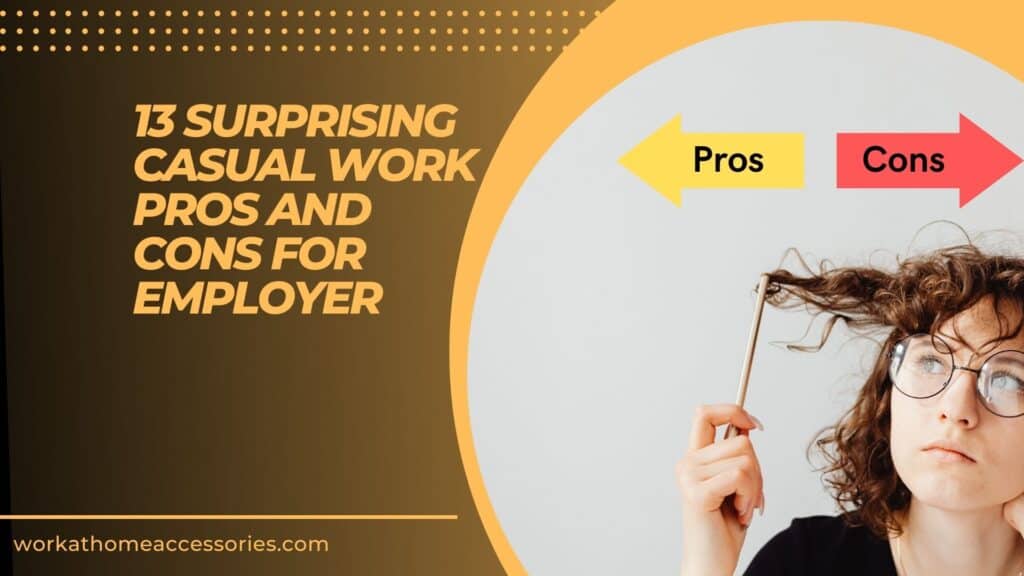This page contains affiliate links. As an Amazon Associate, I earn from qualifying purchases.
Casual employment is a work model that can work for many businesses. But considering it’s not extremely popular, is it really worth it? Let’s evaluate them in this casual work pros and cons for employer article. Read on to see if casual worker contracts are all they are cracked up to be!
If you’re in a hurry, here is a site I recommended for office equipment with lifetime guarantee!
Casual Work Pros And Cons For Employer
| Casual work advantages for employer | Casual work advantages for employer |
| Greater flexibility with work hours | Workers may refuse work |
| No overtime expenses | Can be more expensive due to casual loading |
| Easier to terminate contracts | Workers don’t need to provide notice period |
| Less requirements to provide holidays | Long term casual workers develop entitlements |
| Less requirements to provide benefits | More difficult to retain workers |
| No requirements to provide redundancy pay | Can be less productive |
| Helps screen worker before providing a contract |
As you can see from above, casual employment has both positive and negative attributes. Let’s dive deeper into each of these points. After reading this, you’ll be able to determine if casual workers are a match for your company.
In a study of workers, 54% stated that they were in a part-time or flexible role. Source

Casual work advantages for employer
Greater flexibility with work hours
Traditional job schedules mandate having staff present for certain hours, regardless of whether there is work or whether they’re doing work. This can be an ineffective working model, especially if you need staff to come in at short notice or during unsociable hours.
With zero-hour contract work, staff can be scheduled to work when there is work to be completed.
This work model increases productivity as staff are only in when there is work to be done, or if there is some flexibility, they can choose to work hours when they feel most productive.
Related: Does A 4 Day Work Week Save Money? Discover How to Save Now!
No overtime expenses
With casual employment, there is no requirement for an employer to pay overtime as there is no stipulation as to how many hours and what hours a person will complete on this type of a contract.
This can save an employer significantly on wages, especially if people are frequently coming in on overtime, weekends or public holidays.
This would normally equate to time and a half or even double time.
Easier to terminate contracts
With permanent and temporary contracts, employers are obliged to provide notice to the employee that they are terminating their contract. This means a notice period of up to 60 days needs to be provided for mass layoffs or plant closures.
No notice period is required if the contract is being ceased due to misconduct.
This clause doesn’t exist in casual employment contracts. This means if work dries up suddenly or the busy period ceases, the contract can be easily and quickly terminated.
Consequently, employers are absolved from paying for employees to work out their notice period or paying them off.
Related: Part Time Work Pros And Cons – The Ultimate Cheat Sheet!
Less requirements to provide holidays
There are no requirements to offer holidays on zero-hour contracts. In many scenarios, workers won’t need to take holidays as they will have a decent amount of time off anyway.
The employer therefore doesn’t have to consider statutory requirements, deal with scheduling their tracking and holidays or pay for their time off.
Less requirements to provide benefits
Casual work contracts have minimal benefits with regards to pension contributions, holiday pay or bonuses. This can save an employer significantly if they hire a casual worker instead of an employee.
The nature and duration of casual employment contracts makes it difficult to implement such benefits anyway.
However, if the contract continues for too long, obligations can start to arise including:
- Requesting flexible working conditions
- Taking parental leave
Furthermore, the company needs to evaluate if the cost of casual loading is more cost effective than that of an employee.
No requirements to provide redundancy or severance pay.
Redundancy payments for letting a worker go are generally a high expense on a company. Even more so if a worker has been employed for many years.
Generally, severance pay equates to one week of pay per year of service up to 10 years. After 10 years, it equates to 2 weeks of pay per year of service.
Zero-hour contracts omit the requirement to provide redundancy pay. Plus, it means you don’t have to hold onto a worker for a notice period and pay them for it as well as redundancy pay.
Helps screen worker before providing a contract
When recruiting workers, an employer can often only go off the impression they were given during the interview and references.
With casual workers, you essentially get to complete a trial run with the worker without any obligations or mention of providing them with a permanent job.
Consequently, you can see how talented they are and how good of a fit the person is for a company.
If they make a good impression, this could open up opportunities for a position within the business.
Casual work allow greater work flexibility
People who work on casual workers tend to have more unorthodox hours and fewer working days to people in a standard 9 – 5 job. This often grants them greater freedom and flexibility with their work hours.
For instance, a company might establish core working hours where staff must be present. Once those hours are worked, staff can work up the remaining hours when it suits or when it’s needed by the company.
Plus, if staff work on longer shift patterns during busy periods, they may have fewer commutes to work and more days off as a result.
Zero-hour contracts are not just for seasonal industries. They are also becoming more prevalent in companies that want to offer flexible working arrangements to their staff.
This also lends itself to greater talent acquisition and talent retention as more workers want greater flexibility with their working hours.
Related: Best 4 Day Work Week Alternatives – 7 Proven Strategies!
Casual work disadvantages for employer
Workers may refuse work
Unlike annualized hours, people on casual job contracts have the choice to accept or reject the work. This means that as an employer, you may struggle to find people to work, especially on short notice or during unsociable hours.
These last-minute requests often won’t suit many people, especially if workers receive short notice.
Staff may be able to refuse to come in on overtime. However, there is usually a clause in their contract stipulating that such requirements may be needed occasionally to meet business needs.
While employers can give staff a heads up regarding upcoming work, there will always be occasions where an unexpected work demand arises.
Can be more expensive due to casual loading
You might be under the illusion that casual work is cheaper because an employer doesn’t need to offer benefits and pay for holiday leave. What people neglect to consider is that casual workers tend to receive a casual loading in lieu of leave.
Casual work can equate to higher costs than a full-time or part-time worker.
This is something that you’ll need to run some figures on to determine which is cheaper and best value for money.
Some companies have limited benefits, others have more generous benefits packages which can become costly when added up.
Workers don’t need to provide notice period
Just like companies don’t need to provide a termination notice to casual employees, there is no notice period required when casual workers wish to end a contract.
This can leave a company at a loss, especially if the notice period is short, there is nobody else to cover or the role is specialized.
Long term casual workers develop entitlements
If a casual worker becomes employed on a continuous basis with no breaks in the days that they work, obligations become greater for the employer regarding holiday and sick leave entitlements.
Consequently, a gray line exists with regards to how to treat such workers.
It could end up requiring more management of hours worked by casual workers if a company wants to avoid such obligations
Related: 4 Day Work Week V 5 Day – Full Of Surprising Facts & Results
More difficult to retain workers
Casual employment contracts are usually less structured than traditional 9 – 5 roles, especially in seasonal work or roles with quiet and busy periods. This is combined with lack of job security and the uncertainty of work and wages.
All these factors make it more difficult to retain workers due to unpredictable hours and pay rates.
High turnover can be expected for casual workers which creates disruption and delays to work being completed.
Tip: Establishing a structure with plenty of advanced noticed and providing as much information regarding expected work hours should make retaining casual job contracts easier.
Can be less productive
Since casual workers often need to be trained up to perform certain tasks and new workers are generally slower at a task, it can reduce productivity and efficiencies that employees would offer.
This model may work for skilled workers who know exactly what they’re doing when they are performing work.
However, a lack of knowledge regarding systems and downtime required for staff to teach the new person can consume a significant amount of time.
This is especially evident if there is high turnover with casual workers.
Conclusion
Casual job arrangements can be advantageous for businesses who have seasonal work and busy periods. Additionally, it can sometimes save costs associated with hiring staff.
It’s not without disadvantages though, these need to be weighed out agains the benefits to determine if they are a suitable solution to an employment gap.
The casual job contract strategy is only one of many strategies that can be utilized to avail of workers and allow more flexibility in the role.
If you’d like to hear about other flexible working strategies, I’ve listed them below for easy access:
- Casual Work v Full Time – A Guide & Which Pays You More?
- Casual Work v Part Time – 6 Remarkable Differences!
- Part Time Work Pros And Cons – The Ultimate Cheat Sheet!
- Annualized Hours Pros And Cons – 12 Important Points To Know
- 4 Day Work Week V 5 Day – Full Of Surprising Facts & Results
Recommended products:
- The 4-Hour Workweek: Escape 9-5, Live Anywhere, and Join the New Rich (link on Amazon)
- Top quality L-shaped desks with lifetime warranty and free shipping (link on OfficeFurniture2Go)
- CoolMesh Pro Multi-Function Chair (link on OfficeFurniture2Go)

